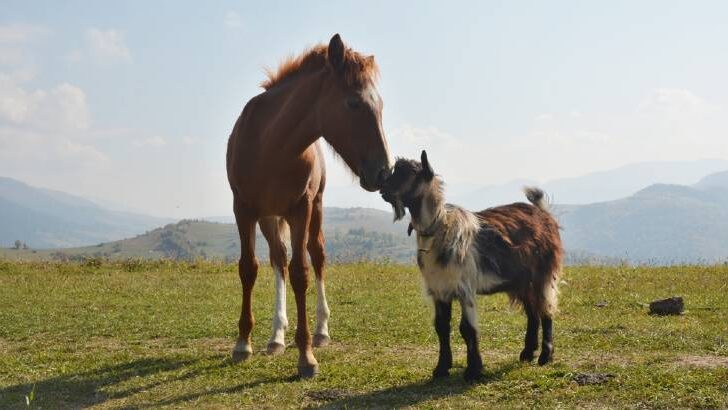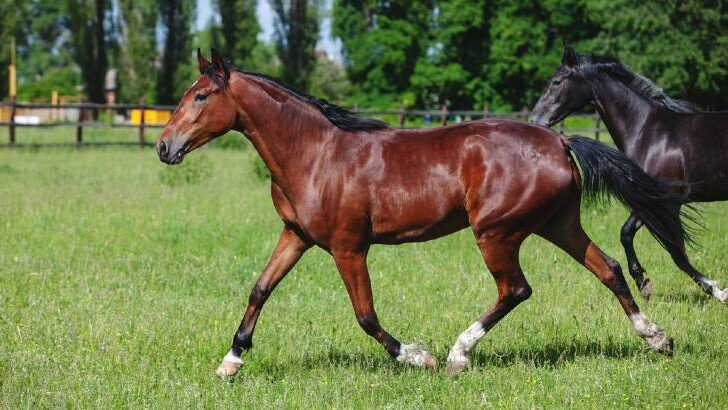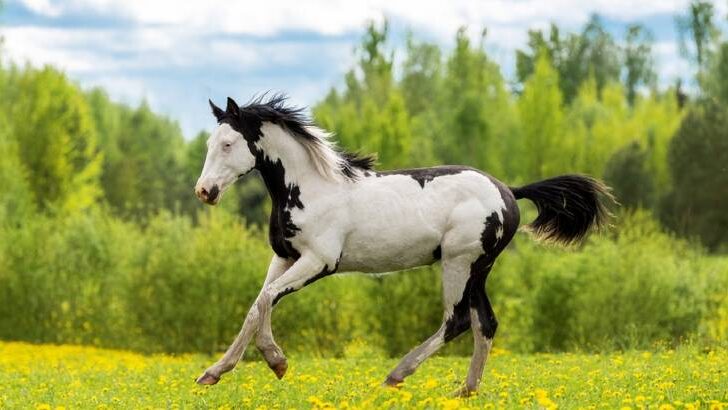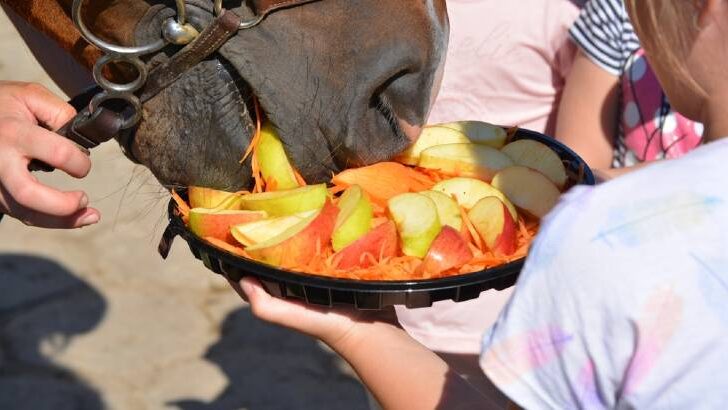Affiliate Disclaimer
As an Amazon Associate I earn from qualifying purchases. It helps me keep the website going. Thank you for your support.
Goats are possibly one of the cutest farmyard animals around, and they make great pets. They also make great companions and are popular for their ability to help keep horses calm. But what do you need to know when choosing a type of goat to buy? What type of goat makes a good horse companion?
When choosing a type of goat for companionship, gender matters most, followed by age, personality, and breed. Entire males can be aggressive, and young goats require more intensive care. Choosing a breed depends on whether you want a dual-purpose pet from which you can get milk or fiber.
Just like buying a horse, buying a goat takes a lot of time and research. Read on to learn more about how to choose the perfect goat!
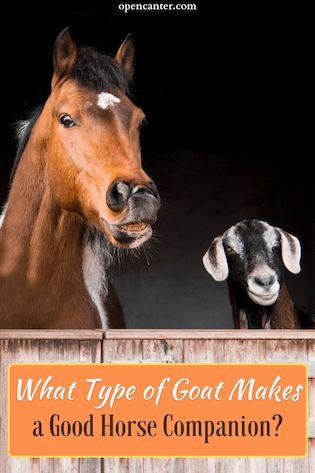
The History Behind Goats and Horses
Goats have a long history of being good friends with horses. It is unknown when the idea first came about. History shows that goats were used as calming companions for racehorses. They would keep the horse company in the barn, as well as away at the track.
The companion goat would often be found either in the stall with the horse, or just outside. Interestingly, it is this history where the phrase ‘get your goat’ is thought to come from.
The term means ‘to irritate someone’. It is thought to stem from how people would try to steal or hide the companion goats at races. They did this to try and get an advantage over the other horse/s in the race. The horse left without its companion, would become anxious and would not perform as well.
This practice became so commonplace that most grooms or owners stood guard over their horses and goats. Hence, the term ‘get your goat’ stems from people stealing goats to irritate other owners!
Nowadays, it is not uncommon to see horses and goats grazing side by side. They are a popular choice as a companion animal, due to their size. They don’t require as much land or feed as a larger animal, like a sheep or a cow. Plus, they are very cute!
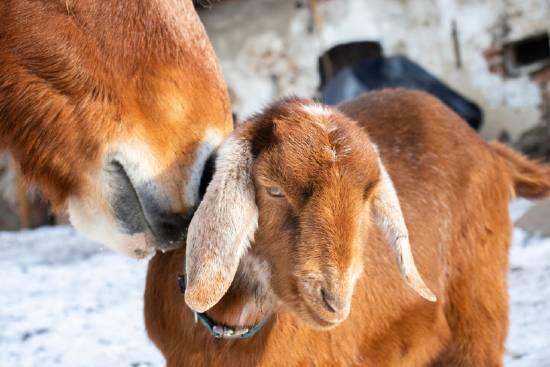
Which Breed of Goat is Best Suited to Being a Companion For a Horse?
When it comes to choosing a type of goat to be a companion for your horse, the breed doesn’t really matter. Most breeds, from the Alpine to the Nubian, will suit. However, it is generally recommended that you choose a medium to large breed. Because the dwarf or pygmy breeds are so small, your horse may injure them without meaning to.
However, if you want a dual-purpose pet, and want milk or fiber from your goat, the breed matters. Goat breeds tend to fall under one of four main categories. These categories include milk/dairy breeds, meat breeds, fiber breeds, and novelty pet breeds.
For example, a goat breed that has been bred for the purpose of producing milk will do just that. Fiber breeds may require shearing to remove extra coat. Meat and novelty pet breeds don’t generally require any special maintenance.
Common dairy breeds of goats include the Angle Nubian, British Alpine, and the Saanen, to name a few. These breeds produce good quantities of milk when bred.
Examples of fiber breeds include the Angora, Australian Cashmere Goat, and the Pygora goat. The Boer and Kalahari Red goats are examples of meat breeds. Pygmy or miniature goats are classed as a novelty breed (source).
When Choosing a Type of Goat to Buy, Does the Age Matter?
Yes, the age of the goat that you choose certainly matters. This will depend on if you are willing to bottle-feed them or not. If you are, you can buy a goat that is as young as two or three weeks old. This is provided that they have already been weaned from their mother.
Bottle feeding can be a very cute, but very time-consuming process. Depending on the age of the goat, you may have to do four bottle feeds per day. If you do not want to bottle feed, you will need to choose an older goat. At eight to ten weeks old goats are generally eating solid food. Goats of this age are usually almost always weaned (source).
Goats have an average lifespan of eight to 14 years. Some breeds live longer than others. Once a goat is onto solid food and weaned, the age doesn’t matter so much. However, buying an older goat might mean they already have some health issues that need special care.
Additionally, younger goats can be easier to train than older goats. Younger goats accept new things easier than older goats do. Plus, there is less chance they are scared of humans or other animals due to previous bad experiences.
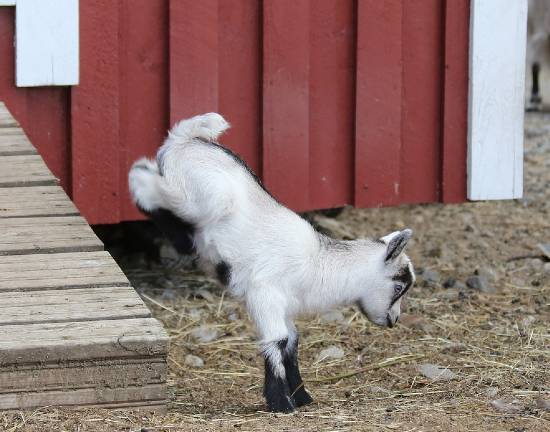
Other Things to Consider When Choosing a Type of Goat
Gender is an important deciding factor. There is some special terminology when it comes to goat genders. Goats under six months of age, regardless of gender, are called kids. Male goats between six months and one year of age are called bucklings, and females, doelings. Mature females are called does or nannies, and entire males are called bucks or billies. Castrated adult males are called wethers (source).
In all circumstances, it is recommended to choose either a doe, doeling, kid, or wether. Bucklings and bucks can be much harder to manage and handle. This is because they often play rougher with others, and can be aggressive.
It is also important to make sure you choose a goat that does not have horns. This could be choosing a breed that does not have horns, or buying one that has been dehorned. Goats with horns can cause serious injury, especially if they like headbutting.
Lastly, it’s important to meet the goat before you commit to buying. Some goats are quite placid, while others are very rambunctious. Depending on what personality your horse has, will depend on what personality you should look for in a goat.
For example, energetic horses who play with toys to occupy their time will do better with a more energetic goat. The two can play together and keep each other entertained. However, if your horse is more reserved, an energetic goat may annoy them. This is where a more placid goat fits in.
How to Introduce Your Horse to a Goat
Introducing your goat and your horse is not as simple as just turning them out together. Doing this can end in disaster, with your horse scared of your goat and vice versa. It may also end up in injury to your horse or your goat.
The key to a great introduction is to take it slow and steady. It is recommended to let the two check out each other from a distance. This will set the foundation that neither animal needs to be scared of the other.
The next step is to bring the two animals closer, so they can meet over the fence. A good way to do this is to have the horse on a lead. Approach slowly, and stop when either animal shows signs of distress.
Once this has happened, set up a temporary goat pen next to your horse’s stall or paddock. This way, they can start to bond over the fence, but be able to move away if things get too much. Stay at this stage for at least a few days, or until both your horse and your goat are comfortable.
Once your horse and your goat are friends over the fence, it is now time to turn them out together. Make sure you are able to supervise them for the first few hours, to make sure all is well. Continue regular checks for the first day or two until both animals settle into a routine.
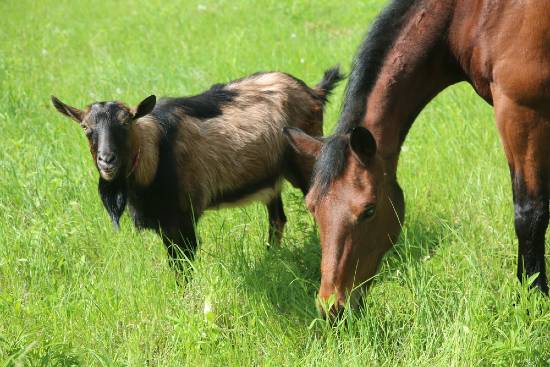
What Sorts of Problems Can You Encounter When Mixing Horses and Goats?
Keeping goats and horses together takes some extra management. For starters, feeding time can be a challenge. Often the easiest way is to separate the two when it is feed time. While sharing hay is okay, pelleted or mixed feeds should not be shared.
This will ensure that your horse does not eat any goat feed. This is a must, as some goat feeds can contain additives that are harmful to horses. Likewise, it is important that your goat does not eat your horse’s feed. Commercial horse feeds can be lethal to goats, either due to additives or due to goats’ tendency to overeat.
Goats are also known for eating just about anything. You need to make sure that any feed is stored very securely, as goats are very clever. Also, make sure there is nothing dangerous in the field that your goat may decide to eat. This includes things like poisonous weeds, plastic buckets, or wooden posts.
Additionally, you may find out that your horse and your goat simply don’t get along. Some horses find goats too rambunctious. Goats like to climb and will climb onto your horse if given the chance. Additionally, if your horse is scared of goats, it is unlikely they will get along.
Keeping goats entertained can be a challenge. Be sure to provide them with safe toys, and forage to browse on. Goats love to climb, so providing them with platforms is a great option. However, make sure their climbing doesn’t lead to escape!
You will also have to regularly monitor your fencing. Goats are well-known escape artists and if there is a small hole, they will find it. They can also be quite destructive, and chew on things like horse rugs or feed tubs.
Final Thoughts
Choosing the right type of goat for you and your horse takes some research, but the results can be very rewarding. While the breed may not matter, choosing a goat of the right gender, age, and personality is vital. Choosing a goat that suits your horse’s personality will set them up for a lifelong friendship.

